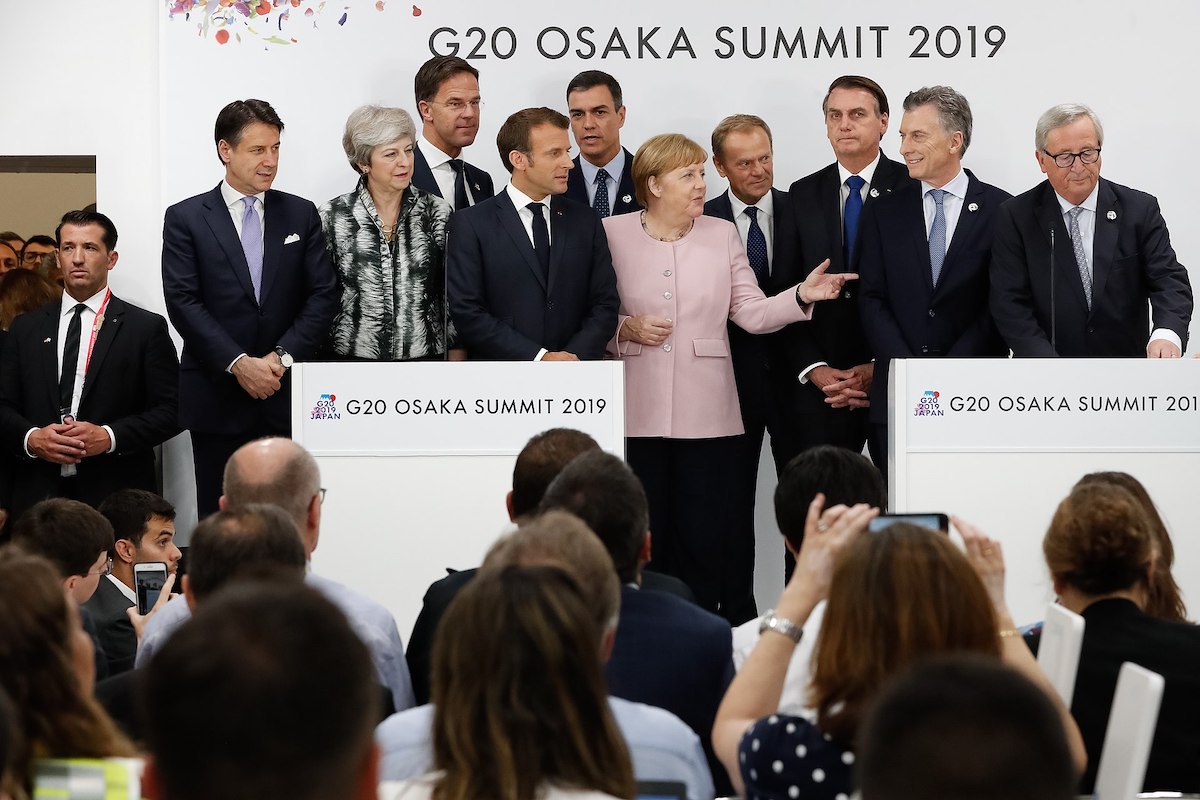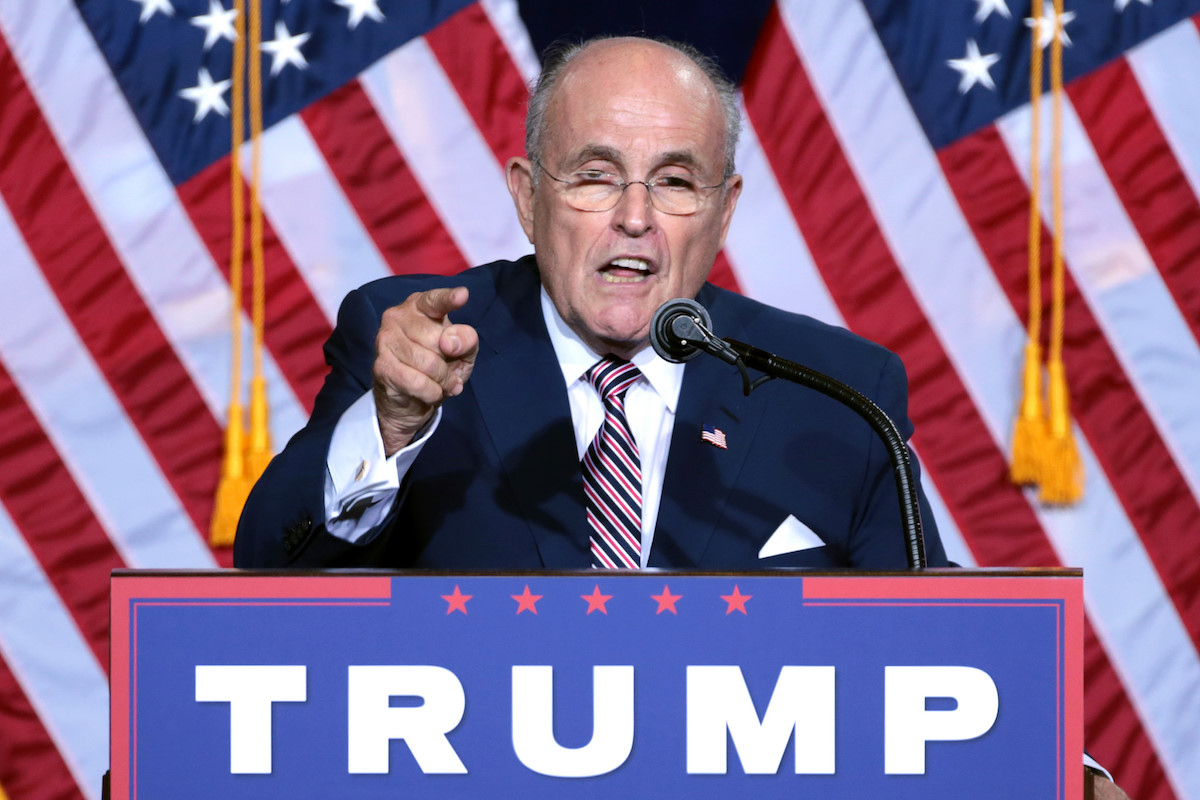Top Stories
Don't Blame Neoliberalism for 'Postmodern Conservatism'
The tides of history ebb and flow, along with doctrines such as neoliberalism, modernism, postmodernism, and whatever it is that follows postmodernism.

The last decade has been an age of political tumult. The rise of right-wing populism is ascendant across the West. Liberal democracy and capitalism are in retreat. Fierce divisions erupted between north and south Europe following the imposition of fiscal austerity measures. In America, there was the Tea Party movement, Occupy, and the rise of social justice as a new form of increasingly brittle leftist dogma. Fuelled by online tribalism, everyday politics has become radicalized, with Brexit in the UK and the stunning election of Donald Trump in the United States. Trump’s Democratic opponent in the coming presidential election may well be Bernie Sanders, an avowed socialist who is promising to implement a policy revolution on the scale of FDR. What is happening?
In his newly published book, The Rise of Postmodern Conservatism: Neoliberalism, Post-Modern Culture, and Reactionary Politics, Tec de Monterrey philosophy professor (and Quillette author) Matt McManus attempts to provide an answer. Drawing on a wide-ranging body of work by leading intellectuals, he argues that the world we knew is unraveling not, as many conservatives claim, by following the lure of postmodern intellectuals, corrupt elites and identity politics, but rather because of the volcanic dislocations caused by established neoliberal policies gone awry.
McManus begins by distinguishing between two conceptions of postmodernism. The first treats it as an academic trend within the humanities that reached peak influence from the 1980s to the early 2000s. This movement embraces a radical skepticism of the Western tradition and rejects grand narratives about history and society. The second conception channels a more “vulgar form,” whereby “Jesus Christ became a cartoon character in South Park fighting alongside Morpheus from The Matrix and Gandalf from Lord of the Rings.” This postmodern milieu is dominated by an omnipresent “culture industry,” which coopts all available cultural symbols, no matter how iconic or revered, for the purposes of entertainment-industry profits.
This is part of a larger trend: Francis Fukuyama’s (now three-decades-old) thesis that the end of history is upon us paved the way for an all-pervasive “form of neoliberal capitalism” that many of us expected to “reign supreme for the remainder of human existence.” Matters of policy, McManus argues, often were reduced to “technocratic matters of how large the state should be, what percentage of the GDP should go to fund social welfare programs and so on.” This “foreclosure” of history caused dismay among progressives seeking deep structural changes in society. Meanwhile “many conservatives came to pine for the good old days of mass conflict and potential nuclear annihilation,” when “a sense of social cohesion and belonging centered around…heroic white men…who demonstrated strong and manly virtues.” There was a “sense that history had passed them by, and left them as little more than…profit[s] and polo.”

Liberal democracy and free-market capitalism, the twin pillars of neoliberalism, thus came to dominate our lives in tandem with a postmodern mindset that liberal and conservative figures alike blamed for social frictions (albeit for different reasons). Eminent intellectuals such as Martha Nussbaum, Ronald Dworkin, Allan Bloom, Camille Paglia, Stephen Hicks, and, most recently, Jordan Peterson, all have attacked postmodernism as a creed that encourages relativism, nihilism or even totalitarianism, while claiming that it undermines Enlightenment values. As a result, McManus argues, postmodernism has been held up as a scapegoat for problems caused by neoliberalism.
Because conservative readers may be far more familiar with postmodernism being denounced as a creed of the Left, some will raise their eyebrows at the idea that conservatism has a postmodern variant. Central to McManus’s case on this score is his distinction between lying and bullshit, which draws on the work of philosopher Harry Frankfurt. Trump, whom McManus describes as “easily the world’s most famous post-modern conservative,” is a bullshitter rather than a liar, effectively denying “that the distinction between truth and falsehood has any meaning if some form of falsehood is necessary to advance his cause, which has always of course been himself first and foremost.” In his lifelong pursuit of shameless self-promotion, Trump has exploited “truthful hyperbole” all the way to the White House. But while Trump successfully deployed his “great skills at marketing and self-promotion,” his 2016 victory went hand in hand with his supporters’ astonishingly high tolerance for his countless personal flaws.
“For post-modern conservatives,” McManus writes, “lying can have little impact”—not because lying is of no moral concern, but because a greater imperative is seen to be at stake: the preservation of political power by a medley of traditionally privileged identities. Reason must step aside in favor of tribal loyalties that work to stabilize and empower the “stereotypical” identities associated with Western civilization. As McManus writes, postmodern conservatives identify as male, straight, white and “ethnic or national Americans, Hungarians or Poles, undervalued by the cosmopolitan elites and forced to take in foreigners and aliens by those who care nothing for the country’s heritage and traditions.”
I do share McManus’s exasperation with Trump’s rhetorical bombast and sheer intellectual dishonesty. But I remain unconvinced that the rise of right-wing discontent and populism across the West (or what McManus calls, following Peter Lawler, “post-modern conservatism”) represents a hostile reaction to the technological transformations caused by neoliberalism—at least to the extent that term is defined in the usual way, as encompassing trade arrangements, foreign interventions, liberal immigration policies, socioeconomic dislocations, and technocratic elitism. Bill Clinton and George H. W. Bush, recall, both raised taxes on high-income individuals, policies that were part of a broader commitment to fiscal responsibility and the viability of social safety nets in many Western nations.
For McManus, neoliberalism seems to function less as a program of distinct policies than “as a particular kind of society with a unique form of governance and characterized by peculiar transformations.” This fuzzier definition leads him to some memorable flourishes, such as tagging Tom Cruise as the “superstar of neoliberal film” for his role in the dystopic Minority Report. But by neglecting a detailed examination of specific neoliberal policies, choosing instead to broadly describe neoliberalism as a concerted attempt to make the world “safe for capital,” McManus assigns to neoliberalism a grand narrative arc that probably doesn’t exist (and which postmodern philosophers, some of whom McManus defends, warned us against). While McManus is correct to point out how swiftly and heedlessly the “culture industry” can co-opt even the most sacred ideas, I see no reason to condemn capitalism for matching supply to demand. To the extent we’re watching TV shows and movies that send up traditional ideas and icons, that’s on us, the customer.
McManus asks us to look at the way economic inequality can undermine human dignity by exacerbating the status divisions in a society. Neoliberal thinkers, he argues, “failed to understand…that many of us do not just seek to improve our welfare [but] also want recognition of our dignity from others.” I agree that dignity is as important as welfare, but I wish someone would show me the neoliberal who thinks otherwise. No less a neoliberal hero than Ayn Rand’s Fountainhead protagonist, Howard Roark, proclaimed that “independence is the only gauge of human virtue and value,” and endured poverty and ostracization, in service to his own ethical and aesthetic ideals.
In keeping with the focus on popular culture, let me close with the 1989 Billy Joel song We Didn’t Start the Fire (released two months before the East German government opened the Brandenburg Gate). Long before anyone had even coined the term “neoliberalism”, the world “was always burning since the world’s been turning.” The tides of history ebb and flow, along with doctrines such as neoliberalism, modernism, postmodernism, and whatever it is that follows postmodernism. As McManus argues, the rise of postmodern conservatism is an important phenomenon. But the lesson for conservatives may not be any more profound than that “the end of history” will never truly be upon us.






